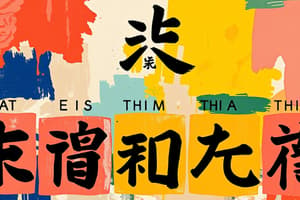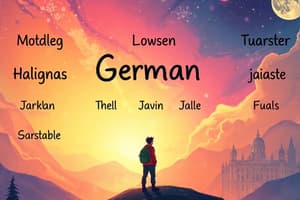Podcast
Questions and Answers
What are some common greetings mentioned in the text?
What are some common greetings mentioned in the text?
- Mountain, River, Ocean
- Monday, Tuesday, Wednesday
- Hello, Goodbye, See you later (correct)
- Red, Blue, Yellow
Which color is often associated with nature, growth, and serenity?
Which color is often associated with nature, growth, and serenity?
- Green (correct)
- Yellow
- Red
- Blue
How many primary colors are mentioned in the text?
How many primary colors are mentioned in the text?
- 2
- 1
- 3 (correct)
- 4
Which number system is not mentioned in the text?
Which number system is not mentioned in the text?
What phrase is commonly used to express a departure in English?
What phrase is commonly used to express a departure in English?
What is the origin of the name 'Monday'?
What is the origin of the name 'Monday'?
Which day of the week is named after the Norse god of poetry and wisdom?
Which day of the week is named after the Norse god of poetry and wisdom?
In most Western countries, which day is considered the first day of the week?
In most Western countries, which day is considered the first day of the week?
What is the meaning of the word 'Saturday' in Old English?
What is the meaning of the word 'Saturday' in Old English?
Which day of the week is associated with the goddesses of fertility and motherhood?
Which day of the week is associated with the goddesses of fertility and motherhood?
Flashcards are hidden until you start studying
Study Notes
Days of the Week
The days of the week have been observed since ancient times and are used in various cultures worldwide. The names of the seven days of the week were derived from the Roman naming system based on the seven celestial bodies visible to the naked eye. In English, these are:
- Sunday: Derived from Old English "Sun's Day"
- Monday: Derived from Old English "Mōnadæg" or "Moon's Day", "Mani's Day"
- Tuesday: Derived from Old English "Tīwesdæg" or "Tiw's Day", named after Tīw or Týr, the god of war
- Wednesday: Derived from Old English "Wōdnesdæg" or "Woden's Day", named after Odin, the Norse god of poetry and wisdom
- Thursday: Derived from Old English "Þūnresdæg" or "Thor's Day", named after Thor, the Norse god of thunder
- Friday: Derived from Old English "Friğedæg" or "Freygesdæg", named after Frigg or Freya, goddesses associated with fertility and motherhood
- Saturday: Derived from Old English "Sāturnsdæg" or "Sāturns' Day", named after Saturn, the Roman god of agriculture
In most Western countries, the first day of the week is Sunday, followed by Monday, Tuesday, Wednesday, Thursday, Friday, and Saturday. However, in some countries, the weekend starts on Saturday.
Greetings
Greetings are phrases that are commonly used to initiate a conversation or to express a polite or friendly gesture. They are an essential part of social interaction and are used in various contexts, such as introducing yourself, acknowledging someone, or expressing respect. Some common greetings include:
- "Hello"
- "Hi"
- "Good morning"
- "Good afternoon"
- "Good evening"
In some languages, greetings can be quite complex and include more than just a simple phrase. For example, in Japan, the way you greet someone is based on the time of day, the person's age, and their position in society.
Farewells
Farewells are phrases used to bid someone farewell or to express a departure. They can be used in various contexts, such as leaving a workplace, ending a conversation, or saying goodbye to someone before parting ways. Some common farewells include:
- "Goodbye"
- "See you later"
- "Take care"
- "Have a nice day"
In some cultures, farewells can be quite elaborate and may include gifts, ceremonies, or even special rituals.
Colors
Colors are a fundamental aspect of human perception and communication. They can evoke emotions, convey meaning, and even influence our behavior. The three primary colors are red, blue, and yellow, and all other colors can be created by mixing these primary colors. Some common colors and their meanings include:
- Red: Often associated with love, passion, and excitement
- Blue: Often associated with calmness, trust, and reliability
- Yellow: Often associated with happiness, warmth, and cheerfulness
- Green: Often associated with nature, growth, and serenity
- Purple: Often associated with luxury, creativity, and spirituality
- Orange: Often associated with energy, enthusiasm, and warmth
Colors can be described in various ways, such as their hue, saturation, and brightness.
Numbers
Numbers are a fundamental aspect of mathematics and are used in various contexts, such as counting, measuring, and expressing quantities. The numbers 1 through 10 in English are:
- 1
- 2
- 3
- 4
- 5
- 6
- 7
- 8
- 9
- 10
Numbers can also be expressed through different number systems, such as binary, decimal, hexadecimal, etc., each with its own set of symbols and rules.
Studying That Suits You
Use AI to generate personalized quizzes and flashcards to suit your learning preferences.




